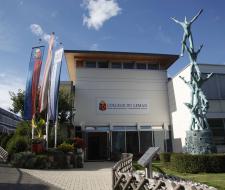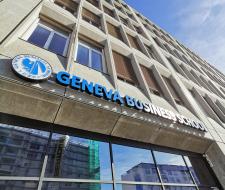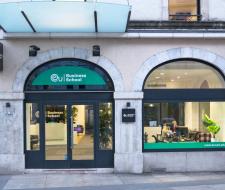Secondary education in Geneva 2026
This content was developed and approved with active participation of Mrs Patricia Woodhouse.
In the process of preparing the material, we referenced the following sources:
- https://en.wikipedia.org/wiki/Education_in_Switzerland
- https://hr.web.cern.ch/state-upper-secondary-level-ii-education-post-compulsory-secondary-schools
-
 In 2024 100% graduates achieved IB Diploma
In 2024 100% graduates achieved IB Diploma SwitzerlandGenevaCurrently watching: 8from 113500.00 CHF / year
SwitzerlandGenevaCurrently watching: 8from 113500.00 CHF / year -

 SwitzerlandGenevaCurrently watching: 1
SwitzerlandGenevaCurrently watching: 1 -
 from 49660.00 CHF / year
from 49660.00 CHF / year -
 from 6940.00 CHF / semester
from 6940.00 CHF / semester
-

-

-
 Individual lessons with the teacher are developed for each student.
Individual lessons with the teacher are developed for each student. SwitzerlandGeneva
SwitzerlandGeneva -

-

-

-

-
 10 Best universities for International Relations and Diplomacy in Switzerland
10 Best universities for International Relations and Diplomacy in Switzerland SwitzerlandGeneva
SwitzerlandGeneva
Geneva has a variety of institutions for secondary education, including public, private, bilingual and international schools. In Switzerland, the federal government sets the general framework for education, but the administration of the education system is largely the responsibility of the 26 cantons. Each canton has its own education department, which determines the structure, academic calendar, educational programs, and language of instruction.
Schooling is compulsory for all children between the ages of 6 and 15, including foreign students. In some cantons, the education system also includes two years of kindergarten from the age of four. In Switzerland, the school year usually begins in mid-August and continues until mid-June the following year, divided into two semesters. The specific dates are set by each canton individually and may vary.
Alternative destinations
Secondary Schools in Geneva: Key Features and Structure
The educational system of Geneva comprises the following stages:
- Primary Education: Covering both kindergarten and primary schooling, this initial phase can extend up to eight years. Preschool focuses on cultivating social skills through engaging activities such as musical exercises, arts and crafts, recreational games, and preliminary lessons in literacy and numeracy. This provides international children with an invaluable opportunity to quickly integrate into Swiss culture and learn a new language.
- Junior Secondary Education: This phase follows primary education.
- Higher Secondary Education: This phase presents options like vocational training (VET), academic high schools, and preparation for undergraduate studies.
- Higher Education: This final phase includes professional training and academic studies at the university level.
Primary Schools in Geneva
Elementary education in Geneva generally spans 4 to 6 years, varying by canton. Teaching is conducted in the canton's official language (German, French, Italian, or Romansh) and covers diverse fields such as languages, mathematics, sciences, social sciences, arts, and physical training.

What makes Swiss schools so special? Why do parents value primary and secondary schools in Switzerland so much?
There are many reasons: safety, the opportunity to participate in activities and play sports all year round (water sports on local lakes, skiing, snowboarding, rock climbing, hiking and trekking, team games), the chance to learn several foreign languages thanks to the rich culture. Switzerland provides education leading to the best universities in the world, and Swiss universities are not only world-class, but almost free (if state-owned!).
Secondary Schools in Geneva for International Students
The shift to secondary school happens at about age 11 or 12. Middle school provides three years of junior high education. The syllabus includes languages, mathematics, science, social sciences, arts and physical activity. Student advancement is evaluated twice a year, focusing on both academic and personal growth.
Upon completion of junior secondary school, students can advance to upper secondary institutions offering either vocational or academic pathways. The organization and content of these institutions vary across cantons.
Enrollment Requirements for International Students in Geneva's Schools
- Children typically start primary school at age 6.
- Enrollment is based on readiness, assessed through parent-teacher meetings.
- Admission is possible anytime, but ideally at the start of a new semester.
- Admission procedures and requirements vary across cantons.
Secondary Schools in Geneva. Cost and Fees for International Students
The cost of study in Geneva starts from 10,000 Swiss Francs. For successful enrollment, international students need to submit:
- Passport copy.
- School report cards.
- International language certificate.
- Teacher recommendations (especially from English and Mathematics teachers).
- Motivation letter (if required).
- Completed registration forms for the chosen school.
The guide describes Geneva's educational environment from primary to secondary education, including the best high schools in Geneva and essential information for international students who want to attend schools in this vibrant city.
Learning programs-summary information
| Name | Meaning | Equivalent | Min. age | Duration, years |
Next stage | Cost |
|---|---|---|---|---|---|---|
| GCSE | General certificate of secondary education | secondary education (non-accomplished) | 14 | 1–2 | A-Levels | 15,000 USD+ |
| A-Levels | Advanced level | secondary education (accomplished) | 16 | 2 | University | 15,000 USD+ |
| BTEC | Business and Technology Education Board | secondary special education | 14 | 2–3 | University/ work | 15,000 USD+ |
| Oxbridge Preparation | Preparing for Oxford and Cambridge | secondary education (accomplished) | 17 | 1 | University | 15,000 USD+ |
| International Baccalaureate | International baccalaureate | secondary education (accomplished) | 16 | 2 | University | 18,000 USD+ |
| Foundation/ Pathway Year | Preparatory year | admission to the 1st year of university | 17 | 1 | University | 14,000 USD+ |
| NCUK | The Northern consortium | 2 year university | 17,5 | 1 | 2 year University of NCUK | 13,000 USD+ |
| Special Preparation (Medics/Math/Business) | Specialized training | - | 14 | optional | optional | 4,000 USD+ |
| Academic English | Academic English | Language school | 8 + | 6–12 months | School or University | 8,000 USD+ |
Advantages and disadvantages of English schools
| Advantages | Disadvantages |
|---|---|
| The opportunity to enter the best universities in England, USA, Canada, Switzerland, Europe, the world | Expensive |
| High quality of education and academic standards | Strong workload |
| Perfect English after graduation | The need to change the social environment; it takes time to adapt |
| Useful contacts | The difficulty of choosing the most suitable school for the child, requires a qualified specialist |
Top 21 boarding colleges in England 2026
| 1 | Cardiff Sixth Form College |
| 2 | National Mathematics and Science College |
| 3 | Abbey College Cambridge |
| 4 | d'Overbroeck's College |
| 5 | MPW London |
| 6 | CATS Cambridge |
| 7 | Kensington Park |
| 8 | DLD London |
| 9 | King's College St Michael’s |
| 10 | Bellerbys Cambridge |
| 11 | Chelsea Independent College |
| 12 | MPW Cambridge |
| 13 | Bellerbys Brighton |
| 14 | CATS London |
| 15 | St Clare's Oxford |
| 16 | Bishopstrow College |
| 17 | CATS Canterbury |
| 18 | Bellerbys London |
| 19 | Ealing Independent College |
| 20 | Cambridge Tutors College |
| 21 | Abbey Manchester |
